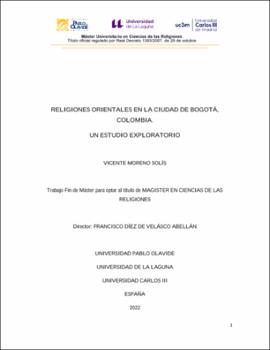Religiones orientales en la ciudad de Bogotá, Colombia. Un estudio exploratorio
Author
Moreno Solís, VicenteDate
2022Abstract
Desde la Constitución política de 1991, en Colombia, se reconoce legalmente la libertad
religiosa, abriendo el espectro de prácticas y experiencias a un abanico mayor que el
precedente, limitado al culto católico. Aunque Bogotá, la ciudad capital, ha mostrado una
tendencia histórica a permanecer bajo un marco de referencia religioso eminentemente
católico, la apertura no ha sido ajena a este territorio. Es por ello relevante conocer, treinta
años después, el mapa de desarrollo de prácticas religiosas plurales y diferentes a la
hegemónica tradición católica, haciendo hincapié en el análisis de las religiones orientales.
En este estudio, se llevó a cabo una investigación cualitativa de tipo exploratorio-descriptiva
al objeto de poder analizar el progreso de la implantación del pluralismo religioso en Bogotá
observando el comportamiento de las religiones orientales.
Los resultados obtenidos confirman que, a pesar del avance en libertad religiosa, en Bogotá
la implantación de espacios de culto asociados a religiones orientales es escaso, debido no
solamente a la competencia generada por un catolicismo dominante y un evangelismo en
ascenso, sino también por la emergencia del ateísmo y de experiencias de religiosidad
amparadas en el marco de la “new age” o nuevas espiritualidades que absorben en gran
medida su lenguaje, prácticas y objetos de culto favoreciendo su desdibujamiento y
relegándolas a un espacio de influencia limitado. Since the Political Constitution of 1991, in Colombia, religious freedom is legally
recognized, opening the spectrum of practices and experiences to a greater range than the
previous one, limited to Catholic worship. Although Bogotá, the capital city, has shown a
historical tendency to remain under an eminently Catholic religious framework, the opening
has not been foreign to this territory. It is therefore relevant to know, thirty years later, the
development map of plural religious practices different from the hegemonic Catholic
tradition, emphasizing the analysis of Eastern religions.
In this study, an exploratory-descriptive qualitative research was carried out in order to
analyze the progress of the implementation of religious pluralism in Bogotá by observing
the behavior of Eastern religions.
The results obtained confirm that, despite the advance in religious freedom, in Bogotá the
implementation of places of worship associated with Eastern religions is scarce, due not
only to the competition generated by a dominant Catholicism and a rising evangelism, but
also by the emergence of atheism and experiences of religiosity protected in the framework
of the "new age" or new spiritualities that largely absorb their language, practices and
objects of worship favoring their blurring and relegating them to a limited space of
influence.





